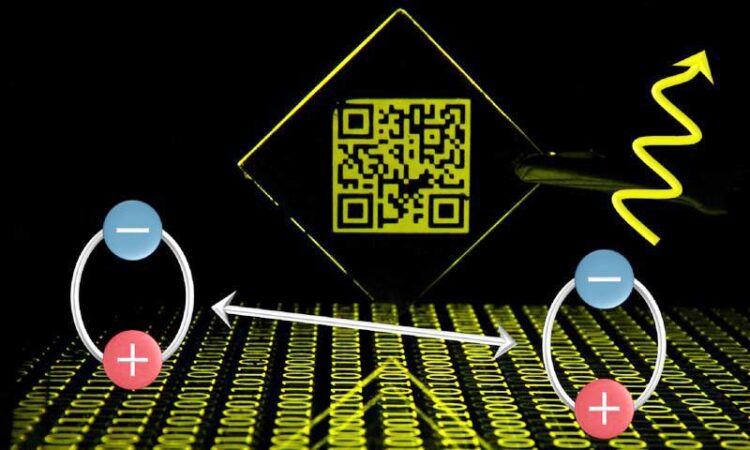Development of imperceptible photonic information technology

Prof. Sebastian Reineke and his group have already presented prototypes of programmable luminescent labels in 2019. So far, however, the prerequisites for industrial application are lacking.
(c) Sebastian Reineke
Prof. Sebastian Reineke from TU Dresden has been awarded a Consolidator Grant from the European Research Council (ERC) in the amount of 2 million Euro for his research project SLOWTONICS. In this project he wants to initiate a paradigm shift in modern technology by developing and using biocompatible components. Project launch is January 2024.
Modern technology has fundamentally changed our lives in recent decades and has permeated almost all areas of our lives. Communication, transportation, energy, industry or health – in these and many other sectors, modern technology has optimized processes and opportunities, often even revolutionizing them. However, research into new, modern technologies is nowadays not only focused on improving the efficiency of components, but also often follows sustainable and minimalist design principles in order to reduce the ecological footprint.
Photonic applications, for example for information processing in logistics or in sensor systems, currently require increasingly complex technological solutions to accelerate data storage and processing. In conventional technologies, this involves the use of numerous non-reusable materials and highly-complex systems. With the new Consolidator Grant project “SLOWTONICS – Slow excitonics for minimalistic and sustainable photonic and optoelectronic systems” – Prof. Sebastian Reineke and his LEXOS group at TU Dresden aim to achieve a paradigm shift based on biocompatible organic optoelectronic and photonic components over the next five years.
“At the heart of SLOWTONICS, we combine the concept of digital luminescence that my team has developed with long-lived excitonic states with lifetimes of milliseconds or longer, to create a flexible and sustainable photonic framework for future applications,” explains Reineke, who has held the Chair of Organic Semiconductors at TU Dresden since 2016. By using organic semiconductors, such systems offer a low ecological footprint, low material consumption and a high degree of material tunability for tailored technological solutions. The focus on comparably slow processes (> microseconds) has the great advantage that the information processing will become much easier, rendering the use of complex hardware obsolete. Initial prototypes of programmable luminescent tags have demonstrated the potential of this technology. However, the prerequisites for industrial application are still lacking.
“Based on my research group’s existing expertise in organic optoelectronics and spectroscopy of soft luminescent materials, SLOWTONICS will overcome current limitations to realize industry-relevant systems for optical data storage and exchange, and expand the application of digital luminescence toward luminescent security tags and multicomponent sensor systems. Having developed novel communication components, we will seek to realize these designs using only naturally occurring materials. This is an essential final step, as a world with an ever-increasing demand for information requires systems that provide functionality and enable responsible use. Our approach targets systems that have a material footprint of < 0.1 mg/system, making them truly minimalist and sustainable,” says Reineke, describing the long-term goal of the project.
About the Light-Emitting and eXcitonic Organic Semiconductor (LEXOS) Group
The LEXOS group is part of the Dresden Integrated Center for Applied Physics and Photonics Materials (IAPP) and the Institute of Applied Physics of the Technische Universität Dresden and led by Prof. Sebastian Reineke. One focus of the LEXOS group is the investigation of excitonic and luminescent systems covering organic and other related emerging materials. The group has strong expertise in the optical spectroscopy of such systems. One current example is the investigation of organic biluminescence, where luminophores show both fluorescence and phosphorescence at room temperature. Further, the LEXOS group has long-standing expertise in the research and development of organic light-emitting diodes (OLEDs). The current OLED research comprises stack and concept development, devices optics, charge transport and recombination studies, long-term stability investigations, material development (dopant and emitter materials), and device integration.
Website: https://tu-dresden.de/mn/physik/iap/oh/forschung
Contact
Prof. Dr. Sebastian Reineke
Institute of Applied Physics
TU Dresden
Tel: +49 351 463-38686
sebastian.reineke@tu-dresden.de
Wissenschaftliche Ansprechpartner:
Contact
Prof. Dr. Sebastian Reineke
Institute of Applied Physics
TU Dresden
Tel: +49 351 463-38686
sebastian.reineke@tu-dresden.de
Weitere Informationen:
Media Contact
All latest news from the category: Information Technology
Here you can find a summary of innovations in the fields of information and data processing and up-to-date developments on IT equipment and hardware.
This area covers topics such as IT services, IT architectures, IT management and telecommunications.
Newest articles

Innovative 3D printed scaffolds offer new hope for bone healing
Researchers at the Institute for Bioengineering of Catalonia have developed novel 3D printed PLA-CaP scaffolds that promote blood vessel formation, ensuring better healing and regeneration of bone tissue. Bone is…

The surprising role of gut infection in Alzheimer’s disease
ASU- and Banner Alzheimer’s Institute-led study implicates link between a common virus and the disease, which travels from the gut to the brain and may be a target for antiviral…

Molecular gardening: New enzymes discovered for protein modification pruning
How deubiquitinases USP53 and USP54 cleave long polyubiquitin chains and how the former is linked to liver disease in children. Deubiquitinases (DUBs) are enzymes used by cells to trim protein…



